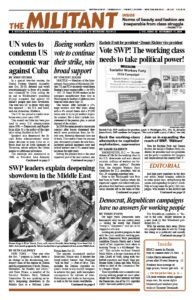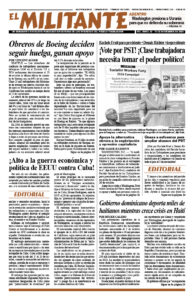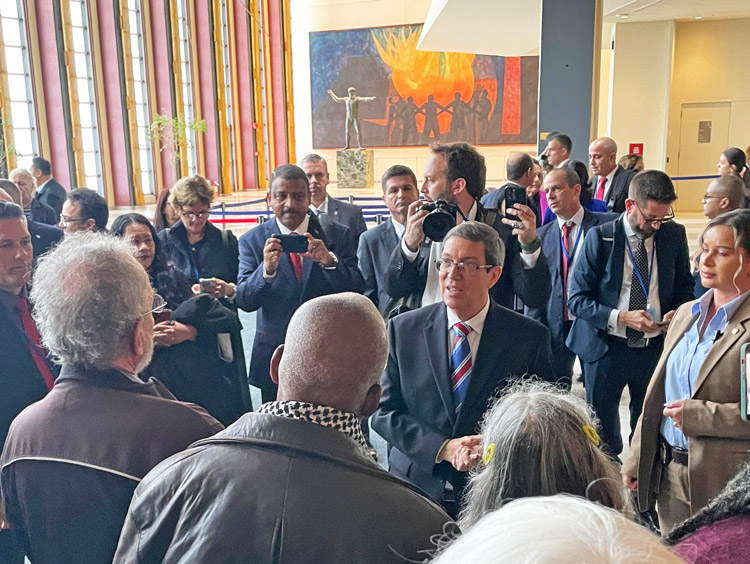In a special two-day session, the United Nations General Assembly met Oct. 29-30, debated and voted overwhelmingly in favor of a resolution submitted by Cuba calling for an end to Washington’s punishing 65-year economic war against the island’s people and their revolution. The vote was 187 in favor, with only two opposed — the U.S. and Israel, and one abstention, Moldova.
The U.N. has passed a similar resolution every year since 1992.
This assault on Cuba has been pursued by every U.S. administration since 1961 — Democratic and Republican alike. It is the policy of the capitalist ruling families in the U.S.
Speakers also denounced the Joseph Biden administration’s outrageous decision to keep Cuba on its witch hunt list of State Sponsors of Terrorism, which subjects the Cuban people to additional privations.
The embargo was announced in 1960, as President John Kennedy acted on a secret State Department memorandum from Lestor Mallory. Noting that “the majority of Cubans support Castro,” Mallory proposed an economic war that “makes the greatest inroads in denying money and supplies to Cuba, to decrease monetary and real wages, to bring about hunger, desperation, and overthrow of government.”
Cuba’s Minister of Foreign Affairs, Bruno Rodríguez, addressed the U.N. session Oct. 30. “For five consecutive days, from Friday, Oct. 18 to Wednesday, Oct. 23, Cuban families had no electricity, except for a few hours,” he said, adding that these difficulties were exacerbated by the effects of Hurricane Oscar, which hit hardest in Guantánamo Province.
“The primary cause of the National Power System failure was the lack of fuel,” as well as “the precarious conditions of our power plants,” he said, both “a direct consequence of the extreme economic warfare measures applied by the U.S. government.”
“In the last few years the Cuban economy has experienced unprecedented difficulties,” he said. The causes “are varied,” but “in the case of Cuba, what makes this situation unique and extraordinary is the deliberate determination of the United States to asphyxiate the national economy; sabotage and impose insurmountable obstacles to prevent our growth and development.”
He pointed out, “Under Joseph Biden’s presidency, the losses caused to Cuba by the blockade amount to more than $16 billion.”
“More than 80% of our population has only known Cuba under a blockade.”
“Our people and government highly appreciate and are deeply grateful,” he said, “for all the valuable expressions of support and solidarity received” at the meeting.
Strong support for Cuba
During the debate over 30 governments and international organizations spoke in favor of the resolution.
Many of the most heartfelt and strong comments came from governments in the Caribbean, and others who have benefited from Cuba’s solidarity. Ché Phillip, speaking both as the representative of Grenada and on behalf of Caricom, the Caribbean Economic Community, said, “Grenada stands with Cuba!” He described the political and material solidarity between the two peoples and strong diplomatic relations between the two governments.
Like virtually every other speaker from a Caribbean government, he placed the blame for the recent collapse of the electrical grid in Cuba on Washington, saying the U.S. government had strangled Cuba’s access to fuel, as well as its access to world credit and banking channels. He spoke of the selfless aid Grenada and other Caribbean countries have received from Cuba, in health care, sports and more. “Such solidarity makes the world a better place.”
“Belize unequivocally condemns the illegal and unjust unilateral economic, commercial and financial embargo imposed on Cuba by the United States of America and calls for its immediate and unconditional end,” said a statement submitted by that country’s U.N. representative, Carlos Fuller. He also condemned “the arbitrary and baseless designation of Cuba as a State Sponsor of Terrorism … which only serves to perpetuate a narrative that is not reflective of the principles or actions of the Cuban government and people.
“Cuba has continued to exemplify resilience, solidarity and generosity, providing invaluable support to our region,” he added. This has been “transformative for Belize, significantly enhancing our national capacity in key areas such as healthcare, education, sports and cultural development.”
Similar sentiments were expressed by Kereeta Whyte, representative of Barbados. She expressed their “deep gratitude for Cuba’s ongoing contributions to our national health service, particularly through the deployment of medical personnel to assist us during the COVID-19 pandemic,” honoring Cuba’s “unwavering commitment to solidarity.”
Speaking for Saint Lucia, Menissa Rambally pointed to the wide-ranging effects of Washington’s economic war on Cuba. “It affects and restricts access to foreign currency, inputs, raw materials, fuels, machinery, fertilizers, chemical products, technologies and the imposition of penalties on shipping companies that would otherwise service Cuba.”
“The unjust and abusive blockade against Cuba constitutes, without a doubt, one of the most serious, prolonged and systematic violations of international law and of the Charter of the United Nations,” Sophia Tesfamariam, ambassador to the U.N. from Eritrea, said.
“Cuba exports solidarity, not violence,” she said. “Since 1963, this small country has been showing to the world the true meaning of both solidarity and cooperation, by sending countless medical brigades to communities in need.”
The representatives from Dominica, Guyana and Trinidad and Tobago spoke along similar lines, as did the representatives from Vietnam and from Namibia, who called the U.S. embargo “a system of oppression unthinkable in the 21st century.”


